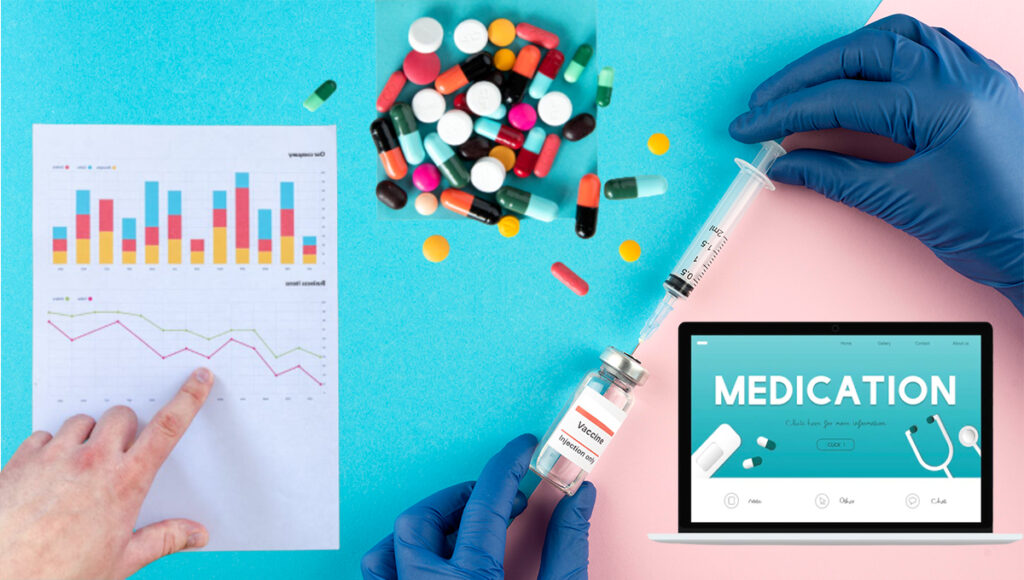
Data has become the crux of the Pharma industry by bringing real-life insights and support in formulating a fact-based strategy. Collection and compilation of the data helps unfold the pattern, identify the gaps, test theories, and interpret the treatment efficacy.
The evolution of Analytics technology and further inclusion of AI, ML, and cloud computing helps in processing and analyzing big data to drive innovation and add value to businesses, contrary to the conventional data collection objectives. McKinsey’s analysis report says scaling the impact of advanced analytics in the pharma industry for five years can help improve their EBITDA as high as 15 to 30 percent. And can accelerate up to 45 to 50 percent if extended for over ten years.
DefineRight (DR) is a data and analytics solutions provider to industries and practices disruptive technologies like big data, analytics, AI, ML, automation, and Cloud-computing. At DR, we help pharma companies model unstructured and big data and analyze and generate insightful reports to meet their complex challenges.

Data in the Context of the Pharma Industry

Pharma and health care industries have a substantial reliance on data to support the three main phases of a drug development cycle; discovery phase, development phase, and clinical trial of a drug. The primary data source for pharma companies is the R&D process, patients, retailers, caregivers, etc. The key objectives driving pharma industries for data collection, modeling, and reporting are as follows:
Discover the Drug Pre-requisites
The human biological system is one of the most complex systems. Therefore, understanding the cause and action mechanism of specific diseases or medical condition requires a comprehensive approach. The use of big data, analytics, and ML helps pharma industries tap a particular segment of the population and study and analyze their health risks or any diseases burden. And thus, identify new potential drug candidates and market for them.
Identify and Verify the Drug Compounds
To search & verify the drug compounds or molecules that can potentially hit the biological target is a complex task. It involves screening millions of drug compounds against the defined target. The big data analytics and ML algorithm combined with CADD (computer-aided drug design) approach help explore large chemical spaces and successful drug design.
Personalized Medications

Individuals have unique genomic molecules, and therefore personalized medications can yield an effective result. Pharma companies use big data and analytics to combine genomic sequencing data, patients’ medical sensor data, and electronic medical records to unfold the patterns and create personalized medications.
Monitor and Improve the Product Safety
Pharmaceutical drugs require proper product visibility and monitoring throughout their lifecycle to avoid serious harm. Cloud-based remote environmental monitoring systems and data logger machines help monitor and create a favorable condition in the entire supply chain to ensure safety. Data logger machines can monitor, record, and report on the environmental conditions of a warehouse or laboratory.
Insight of Patients Behavior
Remote monitoring gives a better insight into patients’ behavior belonging to particular geography or demography. Smartphones, smart pill bottles, or smart pills can collect data on how people take drugs. Companies use these data to provide solutions, track the drug dosage, and prevent abuse and unauthorized use of drugs.
Increase Sales Volume and Develop an Engagement Strategy
Pharma companies usually face a decrease in sales volume of particular drugs. With the help of data science techniques and machine learning models, they can target the segment to identify the gap. And based on the analysis, companies can develop engagement strategies to improve sales volume and sustain their market share.
What Data Analytics Brings to the Table

Pharma companies are venturing into data analytics and innovative technologies to define their challenges, collect relevant data, model unstructured data, and finally develop an analysis report. An in-depth and fact-based analysis report helps bridge the business gaps by fixing complex pharma challenges. Data analytics is rewarding pharma companies in the following ways.
Re-invigorating the Complex Drug R&D
Drug research and development are complex, time-consuming, and valuable procedures. As per Forbes 2013 report, R&D of a new drug brings a cost of around $5 billion, and the development process takes a period of 10 to 15 years. In addition to this, the expiration of drugs patent adds pressure to accelerate the R&D process.
Data analytics expedites the R&D process by extracting correct information from vast data sets of patents, scientific publications, and clinical trials data, giving a real insight to improve decision-making.
Predictive analytics helps analyze clinical data, molecular, and drug compounds to support drug formulation. Several pharma companies are adopting dubbed Project data sphere to get vast data access and accelerate the process.
Re-invigorating the Complex Drug R&D
The clinical trial process collects high-volume data and requires quality and compliance assurance to define the efficacy and reliability of the drug. Application of pharma analytics supports evaluating the drug databases, health databases, human genome, scientific publications, etc. Also, data help authorities target an appropriate population for clinical trials and further make data-driven decisions.
According to McKinsey, big data can even consider genetic information to target niche patient populations and thus speed up the trial process.
Forecast Adverse Events of a Drug

A new drug may have side effects or adverse events on the human body. Adverse event reporting by pharma companies helps forecast adverse events like deaths, life-threatening injuries, disability, hospitalization, etc. They use big data analytics to record and analyze several adverse events based on different parameters. Companies can track, improve, and re-optimize the process to ensure the effectiveness and safety of drugs and support the post-marketing safety surveillance program.
Individualized Approach in Drug Delivery
Pharmaceutical companies comprehend; one size does not fit all. Since in a disease, different patients may respond differently to treatments. Combining the information from genomic sequencing, medical sensor data, and electronic medical records, companies can spot the trend and trend. It supports them to deliver; more targeted or individualized medication for patients with common characteristics.
Pfizer applied this individualized approach to develop Xalkori drugs for lung cancer patients with the ALK gene mutation.
Discover New, Niche, and Underserved Markets
Pharma companies can generate unstructured data from social media, search engines, electronic medical records, demographics, etc. Analyzing this collected information can help them spot and expand their horizon in new, niche, and underserved markets. And also, by evaluating the sales feedback and effort, the pharma companies can update their sales and marketing strategies accordingly to get a competitive edge.
Streamline Regulatory Compliance
The government regulations and regulatory compliance are gradually becoming more stringent, and failing this can result in civil and criminal lawsuits. Big data and analytics help pharma companies identify safety gaps of drugs by uncovering government regulations in multiple geographies and complex legal environments.
Through digital operations, workers can manage their daily tasks on the shop floor and minimize the compliance failure risk.
DefineRight – Defining the Problem Right Towards the Solution

The influx of big data analytics, AI, ML, automation, robotic process, and other pioneering innovations is compelling the pharma industry to induct them to tackle several challenges and boost their operations and performance for a competitive edge.
DefineRight assists businesses in data analytics and reporting with their wide range of services such as data engineering, business process automation, change management, and others. They give constructive and realistic data insight by incorporating high-end technology, AI, ML, cloud build data, and automated simulations. DefineRight helps define the problem right towards the solution by unfolding the new perspective and data patterns.
